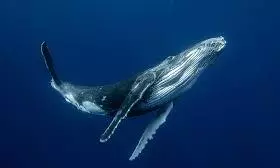
Baleen whales can hear ultrasonic frequencies, says new study
text_fieldsFor the first time, scientists have successfully tested the hearing abilities of baleen whales, revealing that these massive marine mammals can detect ultrasonic frequencies much higher than previously believed.
The groundbreaking research, published in Science, focused on two juvenile minke whales briefly captured off Norway’s coast in 2023.
These findings suggest that baleen whales may use their heightened hearing to evade predators like killer whales.
The study, known as the Minke Whale Hearing Project, involved fitting gold-plated electrodes onto the skin of the captured whales to measure their brain responses to various sound frequencies. Both whales, approximately 12 feet long and weighing one ton each, were released after testing.
However, the research sparked significant controversy within the marine conservation community. Critics, including the Whale and Dolphin Conservation group, expressed concerns over the stress and potential harm inflicted on the animals during their temporary captivity. In an open letter, they urged the Norwegian government to cancel the project, arguing for non-invasive alternatives.
Despite the backlash, marine acoustic consultant Brandon Southall defended the study, stating that strict protocols were followed. He highlighted its importance for shaping future noise pollution policies under frameworks such as the Marine Mammal Protection Act.
The team employed an intricate trapping system along the whales’ migration routes near Norway’s Lofoten Islands. Nets spanning over a mile guided the whales into a holding enclosure, where they were monitored by a multidisciplinary team of 12–15 experts, including veterinarians. Testing sessions lasted 30 to 90 minutes, during which researchers collected neurological data, blood samples, and satellite tags.
While the researchers ensured welfare measures, the project faced a setback when one untested whale died after becoming entangled in a net during a storm.
The study’s findings may have significant implications for understanding and mitigating underwater noise pollution, which poses a growing threat to marine life. However, experts like Susan Parks, a biology professor at Syracuse University, note that the small sample size underscores the need for broader research to assess hearing abilities across different baleen whale species and age groups.






















